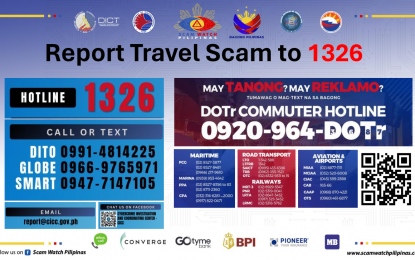
(Image courtesy of CICC)
MANILA – Several government agencies on Wednesday warned the public to be vigilant against scams targeting tourists and travelers as the long Holy Week break draws near.
In a press conference at the National Cybercrime Hub in Taguig City, Cybercrime Investigation and Coordinating Center (CICC) Executive Director, Undersecretary Alexander Ramos said several government agencies in the cybercrime, law enforcement, transportation and tourism sectors are working together to increase the presence of their personnel to safeguard tourist and travelers during the season.
However, Ramos said there is a need for the public to recognize scams and other criminal activities to safeguard themselves.
“Ang importante dito ay ang publiko ma-recognize nila kung ano ang hinaharap nila in the coming days, pagdating ng ating Holy Week celebration (What’s important is the public will realize the challenges they’ll face in the coming days, when the Holy Week celebration comes),” he said.
The information campaign identified 14 different scams that the public should watch out for.
These include fake accommodations —enticing villas, apartments, or seemingly legitimate hotel rooms that are advertised at “unbelievably low rates” but are actually non-existent.
It advised travelers and tourists to book accommodations with reputable agencies or websites, verify reviews, and to speak directly with the owner or hotel.
It also called on the public to watch out against malicious public Wi-Fis that steal personal information, too-good-to-be-true deals, "free vacation" scams, fake travel agents, overpriced tours, charity cons, lost luggage sold on Facebook, fake SIM cards and cheap airline tickets sold on social media.
When out and about, travelers are warned against counterfeit cash, hidden closed circuit television (CCTV) cameras in accommodations, taxis that do not have a meter and would instead charge excessive fees, and fixers of any kind.
In addition to being aware of these scams, Ramos said the public should always try and verify who they are dealing with, especially with online transactions.
“Diyan nagsisimula ang pagiging biktima. Yung hindi natin iniisip yung ating personal safety, basta lang maka-biyahe, maka-book lang, maka-chat na at makahanap ng mura, akala nila 'yun na 'yun (That’s where becoming a victim begins. When we don’t think about our personal safety, when we have a careless attitude on booking tickets or just look at whatever is cheapest, when we accept things at face value),” he said.
The information campaign, he said, will be rolled out in bus stations, seaports, trains, airports, and other transportation and tourism hubs through the help of the Department of Transportation, the Department of Tourism, and the Philippine National Police.
“It is important na maging alert po tayo (It is important to be alert), to look out for these potential scams. And I'm really very happy that we have more agencies taking an active part against scams,” he added.
Ramos also called on the public to report travel scams to CICC’s 1326 hotline, or to reach out to the DOTr for any travel concerns through its commuter hotline at 0920 964 3687. (PNA)
